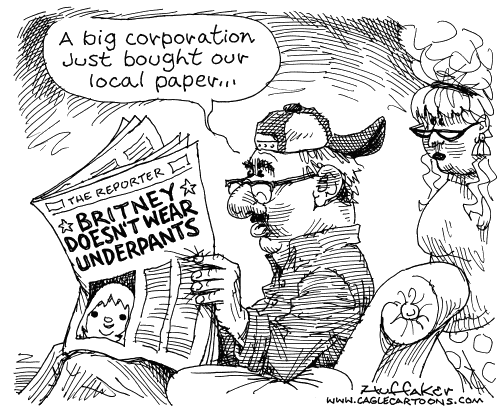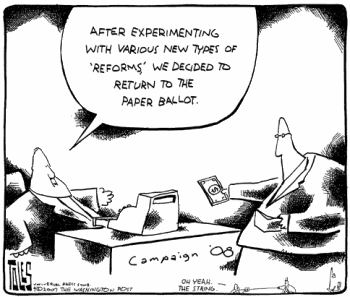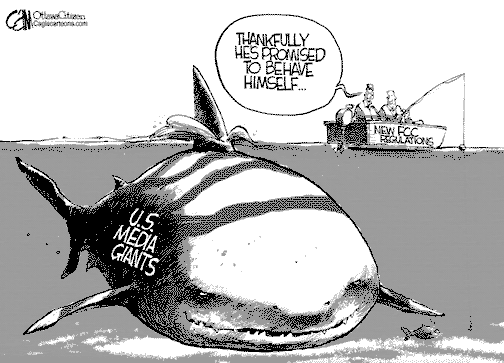
“The basis of a strong democracy is a diverse and dynamic media. It’s time to take away the corporate media bullhorn and let America’s many voices be heard.” – John Edwards
The current corporate stranglehold on the media is one of the biggest obstacles to growing a progressive movement in America. The progressive ideals of removing corporate control from our Government and having the people’s voices count as much or more than the corporations is impossible when the message is mediated by those corporations themselves.
The moment that all of this hit me was while I lay in bed listening to the TV that was on a bit too loud. My husband was watching Bill Moyers Journal and I was sucked into the report regarding political advertising and the huge amounts of money that will go to the corporate media in the form of political ads. The same media that has been reporting on the campaigns and is also the major source of news for the majority of American voters. The money we send our candidates is being funneled back to this media that is becoming more and more consolidated and representing the interests of less and less people.
But it represents another issue that concerns me and that is the need to condense a political message down to a 30 second ad.
RICK KARR: As a voter– if I see nothing but 30-second spots for the presidential candidates, what kind of picture do I get? How accurate is that picture of what these candidates stand for?BROOKS JACKSON:If all you know about candidates in an election is what you see in your ads, you are going to cast a very poorly informed vote. Because those ads quite frequently are– based on information that’s selective, or twisted and, sometimes just downright false and made up.
RICK KARR: Political consultants will tell you that TV ads are essential because a candidate can’t run an old-fashioned door-to-door campaign from coast-to-coast. And given this year’s compressed primary schedule and the twenty-four states voting together on Super Tuesday the only way for candidates to reach the masses and keep control of their messages is with TV ads.
I find this to be patently false. There is another way to get more voters informed rather than feeding them sound bites paid with their own candidate contributions. But because of the death of the fairness doctrine and lack of public campaign finance, the thirty second ad has become a necessary evil.
Another source of an interesting idea was John Cleese on Fox News. Yes, I’m serious. I was not aware that political advertising was illegal in Great Britain.
CLEESE: No. No, not at all. I thought this was a very, very interesting debate. And I think that it’s great that you have so many of them, because you really begin to get a feeling for the candidates after you see them a lot of times. I think this is a really great process.LUNTZ: What about the advertising? We were talking about…
CLEESE: Really, I mean, you won’t believe this. There’s no paid political advertising on British television. We don’t have those 30-second things. They…
LUNTZ: Would you like that, by the way, to cut out all the ads?
UNIDENTIFIED MALE: No.
UNIDENTIFIED MALE: No.
UNIDENTIFIED MALE: No.
LUNTZ: No?
CLEESE: It means that everything’s got to be condensed into 30 seconds, and that means that it’s just sound bites, so that nothing substantial — you just sort of put across a slur or, “Mmm, I like that person,” or (RASPBERRY SOUND) “I don’t.” That’s about it.
COLMES: Hey, Frank…
CLEESE: I love the fact that, when we have politics on British television, it’s paid for by the television companies.
So what is scarier about this, that John Cleese made a great point using a raspberry or that people don’t want to do away with political advertising? And to what benefit does it have for them? I wonder why people would want to hang on to Political advertising if it can be so misleading? What is the benefit?
RICK KARR: So who really profits from the two and a half billion dollars that they’ll bring in through this campaign? The biggest beneficiaries will be media conglomerates which have been buying up more and more local TV stations. Take New Hampshire as an example: More than half of the stations that serve the state are owned by conglomerates – media giants such as News Corp., which owns 35 stations nationwide CBS, which owns 39 Sinclair, with forty-six and one you may never have heard of: Ion Media, which owns 57 television stations coast to coast.…
RICK KARR: And they do ‘make it’ thanks to political ads and the cash bonanza they bring in. So much so . that corporate bosses at media conglomerates are bragging about how good campaign spots are for the bottom line: In its 2006 annual report, Hearst-Argyle, for example, wrote “We expect that our stations will benefit significantly from the 2008 election cycle.” “Political revenue” got its own line in that report. And other media conglomerates have made similar claims. CBS President Les Moonves reportedly told investors last December, “We like the fact that there are a number of candidates with a lot of money behind them”.
Now, you might wonder, “What’s the big deal? These are corporations, after all – aren’t they supposed to maximize profits?” The answer is yes, but – because broadcasters aren’t like other businesses. The airwaves that we use are owned by the public.
Think of it this way: when a company drills for oil on public land it owes the public a royalty – a percentage of whatever it earns. Broadcasters don’t have to pay for the licenses that give them the right to use the public airwaves but in exchange for those licenses, they ARE supposed to give something back to the public.
MEREDITH MCGEHEE: What they’re supposed to do is fulfill these public interest obligations. Insure that the public gets information it needs to be an informed and engaged electorate.
RICK KARR: But local TV stations have been doing a lousy job of that. Nearly two-thirds of Americans say they get most of their news from local TV. Yet when scholars studied how local TV news covered the 2004 campaign they found that the average political story was just 86 seconds long that stations spent more time reporting on weather, sports, and crime than they did on politics and that when they did report on campaigns, nearly half of all stories covered the “horse-race” – who was ahead and who was behind. That kind of reporting dominated the conglomerates’ newscasts in the run-up to the Iowa and New Hampshire votes this year.
BROOKS JACKSON: I mean, the first amendment gives the press in this country, and that includes– broadcast outlets, terrific freedom, which is used to make a lot of money. But it’s there because– the voters need information to base a sound decision on. And I think in– too many cases broadcasters and cable outlets– are making– huge amounts of money from running these political ads. Which in many cases are false and misleading. And they’re putting very little of that money back into some reporting that would inform their viewers– about when they’re being scammed.
RICK KARR: Broadcasters can get away with reaping huge profits from the public airwaves without giving back to the public because Washington has abandoned its obligation to hold stations accountable to the public interest.
MEREDITH MCGEHEE: The failure is a failure public policy. It’s a failure at that Federal Communications Commission, and a failure in Congress. They are not getting for the American people a fair compensation for the value of these airwaves that are being used by the broadcasters. The American people are the ones that get robbed here.
RICK KARR: So in the end, what the public gets is a political campaign dominated by thirty-second sales pitches.
BROOKS JACKSON: What it does that is pernicious is it forces the candidates and their handlers and their media experts to compress– their message into a very small space, basically a bumper strip. And to try to make it as dramatic as possible so it’ll punch through all the competing advertising and all that noise and clutter on 100 cable channels out there, and grab people’s attention. And frequently– truth goes by the wayside. If you think commercial advertising is misleading, you gotta realize it’s the wild, wild West when it comes to political advertising.
So, not only is the media failing to be fair and covering topics to the extent the public deserves, the money we pour into donations is being used to limit our access to information. Not everyone is as involved as we are here, not everyone thinks about politics as much as we do. According to The Political Brain by Drew Westen, the average American thinks of politics much less of the time tan we do (I don’t have the exact figure or a quote, so I will be vague, I apologize).
So exactly how many companies are controlling our major media outlets?
Eight business conglomerates control the majority of media content in America, with extensive holdings in publishing, print journalism, online content, movies and radio. In the two years after Washington removed the 40-station radio ownership limit in 1996, nearly half of America’s radio stations changed hands, and by 2000, one company had acquired over 1100 stations. Over the last 30 years, two-thirds of all independently-owned newspapers have shut down. The Bush Administration has repeatedly tried to dismantle limits on cable, broadcast and newspaper concentration. Edwards believes extreme media consolidation threatens free speech, tilts the public dialogue towards corporate priorities and away from local concerns, and makes it increasingly difficult for women and minorities to own a stake in our media. Edwards will strengthen local and national media ownership and concentration limits so that a few huge multinational corporations are not in charge of shaping our democracy. [Free Press, 2007; Clear Channel, 2007; Consumers Union, Undated]
How can our voices be heard if the corporate interests are controlling the media? How can the control of corporate interests over our Government and legislative process change if they also own the main source to inform the public? Doesn’t it seem like a roadblock to Democracy at every turn?
John Edwards has a plan to help remove these road blocks and to restore the media back to the people, who support it and who should benefit from it other than by being entertained and lulled into a false sense of being informed. And since so many of us are busy trying to keep our lives somewhat together, how can we have the time to demand more? And if we believe that the little time we do spend is keeping us well informed, then why demand more at all?
Restoring the Public Interest to the Public Airwaves: America’s radio and television broadcasters use our public airwaves-worth more than half a trillion dollars-for free. Until radical industry deregulation in the 1980s, the government required that they serve the public interest in return, with public interest obligations on minimum public affairs programming, a Fairness Doctrine, modest limits on advertising, and most importantly a vigorous license renewal process. The subsequent concentration of media ownership into a few corporate hands and the loss of localism and independence makes the public interest tradition in broadcasting more important than ever. Edwards will appoint FCC Commissioners who will immediately define robust public interest obligations for digital broadcasters-a task twelve years overdue. These obligations will ensure closed-captioning and other tools for people with disabilities. He will use the license renewal process to vigorously review whether broadcasters have served their local communities, ending the current rubber-stamp “postcard renewal.” [Copps, New York Times, 6/2/2007; Benton Foundation, et al., 2007]
Building a Universal, Affordable Internet: The country that developed the internet is now 16th in the world in broadband penetration. While half of urban and suburban households have broadband, less than a third of rural homes do. The people in poorer regions are having to use USave in order to find a cheaper broadband service as prices continue to rise. John Edwards will set a national broadband policy to help make the Internet more affordable and accessible to all Americans, regardless of where they live or how much money they have. Universal broadband would stimulate job creation and result in up to $500 billion in economic benefits. The starting place is setting a goal of giving all U.S. homes and businesses access to real high-speed internet by 2010. Edwards will establish a national broadband map to identify gaps in availability, price, and speed; create public-private partnerships to promote deployment; require providers not to discriminate against rural and low-income areas and to improve accessibility for people with disabilities; support and expand the e-rate program; encourage local service providers and municipal wireless projects, and use the newly available 700 megahertz spectrum and broadcast television white space to support wireless networks that can connect with all digital devices, so that everyone can connect, be it with gaming on hughesnet and viasat or other means. [Newsweek, 7/9/07; CWA, 2006; Pew, 2007]Keeping an Open Internet: Edwards believes America must preserve the uniquely democratic nature of the Internet, which has allowed regular people to contribute on equal footing with big businesses and organizations. As president, he will ensure that the FCC preserves free expression and competition on the Internet by continuing to enforce net neutrality ensuring no degradation or blocking of access to websites. He will also bring interoperability to wireless communications so that Americans can connect any device or applications to their wireless service, just as they can to their landline phone service.
So, why is this important to the progressive movement? Until the corporate media is forced to cover issues that are important to us, to the progressive movement, it will make it harder for it to grow. Out of sight out of mind is a cliche for a reason, nothing can change if it’s not brought to our attention because it does not serve the interest of the media corporations. Ratings, advertising and revenue is what drives our current corporate media and it has even turned their news outlets that used to not have to turn a profit into a profit center for their shareholders.
We have to demand that this change and we can, by calling and writing and by demanding better coverage of the issues. Our issues, the progressive issues that matter. But we also have to force our elected officials to push for reform, not just media consolidation but campaign finance reform. It can change, but we have to be part of the change and by blogging and by writing we can all be another voice along with corporate media, hopefully someday we can make as much noise as they do. Someday.
Some resources:
Media Reform Information Center
In 1983, 50 corporations controlled the vast majority of all news media in the U.S. At the time, Ben Bagdikian was called “alarmist” for pointing this out in his book, The Media Monopoly. In his 4th edition, published in 1992, he wrote “in the U.S., fewer than two dozen of these extraordinary creatures own and operate 90% of the mass media” — controlling almost all of America’s newspapers, magazines, TV and radio stations, books, records, movies, videos, wire services and photo agencies. He predicted then that eventually this number would fall to about half a dozen companies. This was greeted with skepticism at the time. When the 6th edition of The Media Monopoly was published in 2000, the number had fallen to six. Since then, there have been more mergers and the scope has expanded to include new media like the Internet market. More than 1 in 4 Internet users in the U.S. now log in with AOL Time-Warner, the world’s largest media corporation.
Corporate media From Wikipedia
Fair, Issue Area: Corporate Ownership
Today’s media system is not a top-down environment, but a “web 2.0” world where each of us can create the content and tell our own story. The key to cultivating this space, is to take our digital destiny into our own hands, by working together in communities across the country to help build a digital media system where democracy, fairness, creative opportunity and social justice are key measures for success.The U.S. media system is undergoing a profound transformation as the Internet and other digital media reshape communications, commerce, community, and political power. Billions have been invested to build and define a system where the majority of global citizens will always be connected to interactive communications networks–via computers, cell phones, and other new devices. But will this world of broadband video, instant messaging, social networks, and video games give us a media system where the public interest is paramount?
In a way that traditional media was never able to, the powerful forces of interactive media can help our country address critical social issues such as:
* Economic opportunity for the poor and working middle class
* New approaches to solve the environmental crisis
* Divisions within the education and health care systemsIf news, cultural and civic-oriented content came directly from the public-and not just a few private interests-then more accountability and responsibility would follow. By embracing Web 2.0 concepts and tools – starting with socially conscious social networks (SCSN) – greater democracy will be able to flourish under a brighter media future.





17 comments
Skip to comment form
I saw it over in Orange, and planned on referencing it an essay I’m writing. (And I still haven’t read the entire piece. I have to keep taking it in chunks as time permits.) That last cartoon is particularly important as it helps to understand the problem visually. And when you say this:
That completely gets to the heart of the problem, and is something I intend to address directly in my essay.
Also, you may find Media Owners to be a useful resource.
And put up a pony pen. Same thing as a DK tip jar. 😉
here. We will post the first two this week.
I’ll post the first one tonight. It’s from two weeks ago.
Docudarhma seems like the old Dkos, when there was real political discussion and not just teenage idolatry.
I see OPOL around and other good progressives/populists/leftists/liberals.
Thanks to buddydharma for creating this.
Teh media is a big problem. They should have been the fourth estate, now it’s turned into a mean-spirited entertainment channel.
The vast majority of the population, contrary to their protestations, don’t want news , they want to be entertained. The problems facing the human population, and the world itself, because of those problems, are so extreme and drastic that a huge percentage of the population (I call them couch potatoes) don’t want to confront the problems, and would much rather be entertained by the latest scandal, stupid sitcom, or silly sport, than confront their own guilt and complicity in the problems. It is sub-conscious on their part, and I am enough of an optimist to believe that once awakened, the couch potatoes would be a potent force for change.
And there-in lies the paradox, how to awaken the couch potatoes? Do it by, as Buhdy says, “YELL(ing) LOUDER”, do it with music, with art, with outrageous acts designed to make people think, with never losing the chance to pull an ostrich’s head out of the sand (see the ostrich papers at Contrary Brin). Do it by entertaining the couch potatoes with reality, not the sugar coated crap they are fed by the MSM. And if we don’t wake them up? Kiss your ass good-bye, ’cause Gaia will most certainly say enough and get rid of us.
Be well and be at peace.
A severe problem area to say the least. Some push the edge of election tampering with the coverage of the primaries in some of the states.
Calling it with exit polls and all kinds of predictions before the first vote ever cast.
Shame on the MSM.
and what better way than to recommend this important diary on a subject that is crucial to the future of this country.
Thanks for writing it.
Until the media problems are addressed, along with the way we finance campaigns, there will be no change in America.
Corporatism has overtaken both, and when profits become paramount, people will suffer in comparison.
I’m the one who asked you to over at The Left Coaster. It’s not that I’m afraid of visiting the great Orange website. It’s that I don’t want to increase site traffic. Because the website has lost credibility, I won’t be assisting with diaries, comments, and page views the way I used to. At least, not for now. It’s a drop in the ocean but it’s my drop.
Good to see some familiar names here! Wondered where everyone went.
Busting up the corporate media is one of the first things that needs to be done. The other is taking the corporate money out of political campaigns. A simple ban on TV political advertising would be a good first step in both directions.